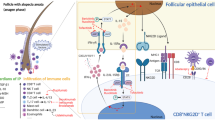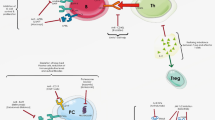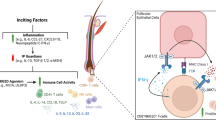Abstract
Subcutaneous adalimumab (Humira®) is a tumour necrosis factor-α blocker that is the only approved agent for the treatment of moderate to severe hidradenitis suppurativa (HS) in several countries worldwide. This article reviews the clinical efficacy and safety of subcutaneous adalimumab in patients with moderate to severe HS. In clinical trials (PIONEER I and II), a greater proportion of adalimumab than placebo recipients reached HS clinical response (HiSCR) at week 12. The main secondary endpoints, such as the proportion of patients with an abscess and inflammatory nodule count of ≤2 at week 12, were significantly greater with adalimumab than with placebo in PIONEER II, but not in PIONEER I. In addition, adalimumab showed the potential to reduce the high health-related quality of life burden of HS and increase patient satisfaction. HiSCR rates were generally maintained in the longer term, and the safety profile of adalimumab in patients with moderate to severe HS was consistent with the known safety profile of the drug for other indications, with no new emerging safety signals. Adalimumab is an effective and generally well tolerated treatment for patients with moderate to severe HS, and is the first agent approved for this difficult-to-treat disease.
Similar content being viewed by others
References
Dessinioti C, Zouboulis C. Hidradenitis suppurativa. In: Katsambas AD, Lotti TM, Dessinioti C, et al., editors. European handbook of dermatological treatments. 3rd ed. Berlin: Springer-Verlag; 2015. p. 411–22.
Collier F, Smith RC, Morton CA. Diagnosis and management of hidradenitis suppurativa. BMJ. 2013;346:f2121.
Zouboulis CC, Desai N, Emtestam L, et al. European S1 guideline for the treatment of hidradenitis suppurativa/acne inversa. J Eur Acad Dermatol Venereol. 2015;29(4):619–44.
Dufour DN, Emtestam L, Jemec GB. Hidradenitis suppurativa: a common and burdensome, yet under-recognised, inflammatory skin disease. Postgrad Med J. 2014;1062(90):216–21.
Esmann S, Jemec GB. Psychosocial impact of hidradenitis suppurativa: a qualitative study. Acta Derm Venereol. 2011;91(3):328–32.
Tzellos T, Zouboulis CC, Gulliver W, et al. Cardiovascular disease risk factors in patients with hidradenitis suppurativa: a systematic review and meta-analysis of observational studies. Br J Dermatol. 2015;173(5):1142–55.
Matusiak L, Bieniek A, Szepietowski JC. Increased serum tumour necrosis factor-alpha in hidradenitis suppurativa patients: is there a basis for treatment with anti-tumour necrosis factor-alpha agents? Acta Derm Venereol. 2009;89(6):601–3.
van der Zee HH, de Ruiter L, van den Broecke DG, et al. Elevated levels of tumour necrosis factor (TNF)-α, interleukin (IL)-1β and IL-10 in hidradenitis suppurativa skin: a rationale for targeting TNF-α and IL-1β. Br J Dermatol. 2011;164(6):1292–8.
Hessam S, Sand M, Gambichler T, et al. Correlation of inflammatory serum markers with disease severity in patients with hidradenitis suppurativa (HS). J Am Acad Dermatol. 2015;73(6):998–1005.
Zarchi K, Jemec GBE. Hidradenitis suppurativa. In: Téot L, Meaume S, Akita S, et al., editors. Skin necrosis. Vienna: Springer; 2015. p. 131–5.
AbbVie Ltd. Adalimumab (Humira®) solution for injection: EU summary of product characteristics. 2016. http://www.ema.europa.eu. Accessed 23 Aug 2016.
AbbVie Inc. Humira® (adalimumab) injection: US prescribing information. 2016. https://www.accessdata.fda.gov/scripts/cder/drugsatfda/. Accessed 23 Aug 2016.
Burness CB, McKeage K. Adalimumab: a review in chronic plaque psoriasis. Drugs. 2015;75(18):2119–30.
Bang LM, Keating GM. Adalimumab: a review of its use in rheumatoid arthritis. BioDrugs. 2004;18(2):121–39.
Croom KF, McCormack PL. Adalimumab: in plaque psoriasis. Am J Clin Dermatol. 2009;10(1):43–50.
Shukla R, Vender RB. Pharmacology of TNF inhibitors. In: Weinberg JM, Buchholz R, editors. TNF-alpha inhibitors. Basel: Birkhäuser; 2006. p. 23–44.
Kimball AB, Kerdel F, Adams D, et al. Adalimumab for the treatment of moderate to severe hidradenitis suppurativa: a parallel randomized trial. Ann Intern Med. 2012;157(12):846–55.
van der Zee HH, Laman JD, de Ruiter L, et al. Adalimumab (antitumour necrosis factor-α) treatment of hidradenitis suppurativa ameliorates skin inflammation: an in situ and ex vivo study. Br J Dermatol. 2012;166(2):298–305.
Koenig D, Noertersheuser P, Okun M, et al. Pharmacokinetics of adalimumab in adult patients with moderate to severe hidradenitis suppurativa [abstract no. 3079191]. In: 23rd World Congress of Dermatology; 2015.
European Medicines Agency. Humira-H-C-481-II-0137: EPAR—assessment report—variation. 2015. http://www.ema.europa.eu. Accessed 23 Aug 2016.
Kimball AB, Okun MM, Williams DA, et al. Two phase 3 trials of adalimumab for hidradenitis suppurativa. N Engl J Med. 2016;375:422–34.
Armstrong A, Pinsky B, Sundaram M, et al. Adalimumab improves dermatology life quality index in patients with hidradenitis suppurativa: pooled data from PIONEER I and II phase 3 randomized controlled trials [abstract no. P0066]. In: 24th European Academy of Dermatology and Venereology Congress; 2015.
Jemec GB, Sundaram M, Pinsky B, et al. Adalimumab improves treatment satisfaction with medication in patients with moderate to severe hidradenitis suppurativa in an integrated analysis from PIONEER I and PIONEER II [abstract no. P0063]. In: 24th European Academy of Dermatology and Venereology Congress; 2015.
Kimball A, Jemec G, Armstrong A, et al. Evaluating optimal medium-term dosing strategy for adalimumab in moderate-to-severe hidradenitis suppurativa: integrated results from the PIONEER I & II phase 3, randomized, placebo-controlled trials [abstract no. 3079375 plus poster]. In: 23rd World Congress of Dermatology; 2015.
Kimball AB, Tzellos T, Geng Z, et al. Clinical meaningfulness of the hidradenitis suppurativa clinical response endpoint to assess inflammation and treatment response in 2 phase 3, randomized, placebo-controlled trials (PIONEER I and II) [abstract no. P0030]. In: 24th European Academy of Dermatology and Venereology Congress; 2015.
Sobell J, Weisman J, Brooks DM, et al. Time to response in patients with moderate-to-severe hidradenitis suppurativa who were treated with adalimumab: results from PIONEER I and PIONEER II [abstract no. P0032]. In: 24th European Academy of Dermatology and Venereology Congress; 2015.
Sobell J, Brooks DM, Geng Z, et al. Time to response in patients with moderate-to-severe hidradenitis suppurativa who were treated with adalimumab: results from PIONEER I and PIONEER II [abstract no. 3495]. J Am Acad Dermatol. 2016;74(5 Suppl):AB75.
Kimball A, Sundaram M, Chen N, et al. Adalimumab is associated with improvements in overall pain and duration of pain response in patients with moderate to severe hidradenitis suppurativa (HS): results from two clinical trials [abstract no. 2982766]. In: 23rd World Congress of Dermatology; 2015.
Megna M, Bettoli V, Chimenti S, et al. Hidradenitis suppurativa: guidelines of the Italian Society of Dermatology and Venereology (SIDeMaST) for the use of anti-TNF-alpha agents. G Ital Dermatol Venereol. 2015;150(6):731–9.
National Institute for Health and Care Excellence. Adalimumab for treating moderate to severe hidradenitis suppurativa. 2016. https://www.nice.org.uk. Accessed 23 Aug 2016.
AbbVie. Humira® (adalimumab) approved by European Commission for moderate to severe hidradenitis suppurativa (HS). 2015. http://abbvie.mediaroom.com/. Accessed 23 Aug 2016.
AbbVie. Abbvie’s Humira® (adalimumab) receives first and only U.S. Food and Drug Administration approval for moderate to severe hidradenitis suppurativa. 2015. http://abbvie.mediaroom.com. Accessed 23 Aug 2016.
Ingram JR, Woo PN, Chua SL, et al. Interventions for hidradenitis suppurativa. Cochrane Database Syst Rev. 2015;10:CD010081.
van Rappard DC, Mekkes JR, Tzellos T. Randomized controlled trials for the treatment of hidradenitis suppurativa. Dermatol Clin. 2016;34(1):69–80.
Moyano-Almagro B, Contreras-Steyls M, Mendez-Abad C, et al. Efficacy and safety of adalimumab in patients with moderate to severe hidradenitis suppurativa. Our clinical experience [abstract no. 1628]. J Am Acad Dermatol. 2015;72(5 Suppl 1):AB208.
Consuegra G, Lacalle M, Vilanova I, et al. Biologic therapies for moderate to severe hidradenitis suppurativa [poster no. 3855]. In: 74th Annual Meeting of the American Academy of Dermatology; 2016.
Dini V, Oranges T, Rotella L, et al. TNF alpha inhibitors and hidradenitis suppurativa: our clinical experience [poster no. 3715]. In: 74th Annual Meeting of the American Academy of Dermatology; 2016.
Acknowledgments
During the peer review process, the manufacturer of adalimumab was also offered an opportunity to review this article. Changes resulting from comments received were made on the basis of scientific and editorial merit.
Author information
Authors and Affiliations
Corresponding author
Ethics declarations
Funding
The preparation of this review was not supported by any external funding.
Conflict of interest
Esther S. Kim, Karly P. Garnock-Jones and Susan J. Keam are salaried employees of Adis/Springer, are responsible for the article content and declare no relevant conflicts of interests.
Additional information
The manuscript was reviewed by: S. Hessam, Department of Dermatology, Venereology and Allergology, Ruhr-University Bochum, Bochum, Germany; T. Tzellos, Department of Dermatology, University Hospital of North Norway, Harstad, Troms, Norway.
Rights and permissions
About this article
Cite this article
Kim, E.S., Garnock-Jones, K.P. & Keam, S.J. Adalimumab: A Review in Hidradenitis Suppurativa. Am J Clin Dermatol 17, 545–552 (2016). https://doi.org/10.1007/s40257-016-0220-6
Published:
Issue Date:
DOI: https://doi.org/10.1007/s40257-016-0220-6




